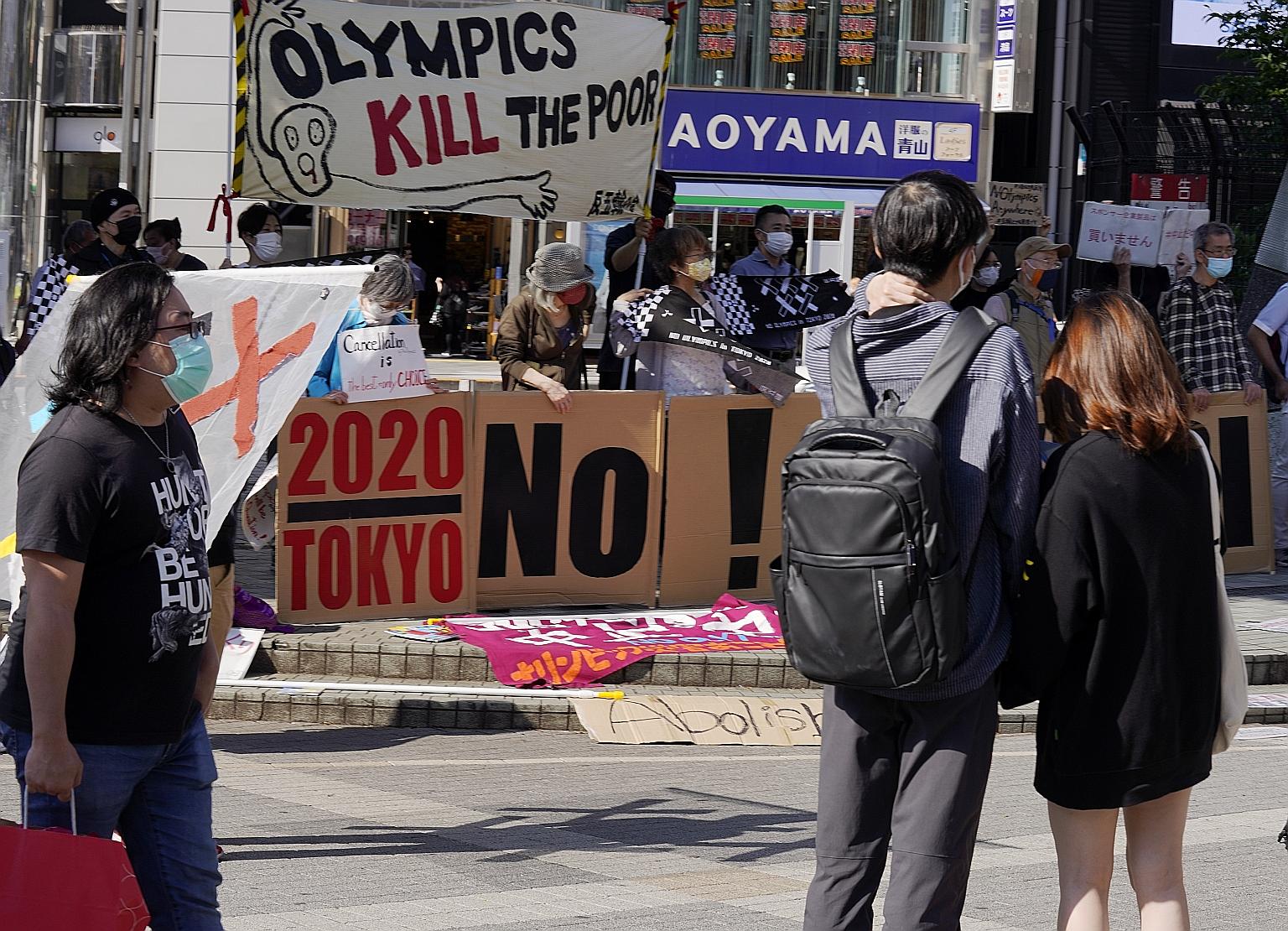Growing public discontent amid countdown to Olympics
Eight in 10 Japanese want Games cancelled or postponed again
Sign up now: Get insights on Asia's fast-moving developments

Residents protesting against the Olympic Games in Shinjuku, in Tokyo. The mood is overwhelmingly negative among media outlets and businesses, as well as the Japanese public.
PHOTO: EPA-EFE
The firestorm came fast and furious when the International Olympic Committee (IOC), already a tyrant in the eyes of many Japanese, insisted last week that the Games will flag off on July 23, state of emergency or not.
Prime Minister Yoshihide Suga dithered and sidestepped questions at a news conference on Friday when pressed if the Games could really safely be held if Japan was under a state of emergency.
He may be heartened by a growing global chorus of support from foreign leaders, including the United States, China, European Union and Singapore, but he has taken a massive knock domestically in a pivotal election year.
About eight in 10 Japanese want the Games cancelled or postponed again. A Tokyo Shimbun reporter said at the nationally televised news conference: "Mr Suga, if I may respectfully point out, you've been dodging questions and offering vague, ambiguous responses throughout the pandemic. The public is very dissatisfied."
Mr Suga replied, with a stiff upper lip: "We are listening to the various voices about the Olympics, and will act accordingly to address these concerns. For now, we are focused on lifting the emergency on time."
The curt exchange epitomised the increasing public exasperation with what people see as characteristically knee-jerk policy-planning over Covid-19, even as Mr Suga hopes that public mood will turn positive as the Games draw near.
Trust in Mr Suga has plunged with the surge in infections. The ongoing emergency was supposed to have expired on May 11, but will now last till June 20, a reflection of the case numbers.
Japan reported 3,596 Covid-19 cases yesterday, down from a fourth-wave peak of 7,236 cases on May 8, though it faces the threat of unlinked cases from potentially more contagious variants.
The Okinawa Times yesterday noted that the government appears to be hedging its bets by not setting explicit criteria for lifting the emergency.
But the mood is overwhelmingly negative among media outlets and businesses, as well as the Japanese public. More than 400,000 people have signed an online petition to cancel the Games.
Architect Haruhiko Takahashi, 35, wrote on Japanese news aggregator NewsPicks: "Local festivals, fireworks festivals, school sports meets, graduation ceremonies, university entrance ceremonies, coming-of-age ceremonies. Many once-in-a-lifetime events have been cancelled."
He added: "What makes the Olympics so special? The logic that this is the only possible time a professional sporting event can be held does not hold water."
The Asahi Shimbun, an official partner for the Games, wrote in an editorial last week asking the Prime Minister to call off the Games: "If the highly divisive Tokyo Olympics are staged without the public's blessing, what will have been gained and lost?"
It added: "The organisers must understand that gambling is not an option."
Behind the outcry is the belief that whatever Japan loses in not hosting the Games cannot be compared to what it would lose if the Games turn out to be a superspreading event.
The influential billionaire, SoftBank Group founder Masayoshi Son, wrote on Twitter last week: "There's talk about a huge penalty (if the Games are cancelled) but if 100,000 people from 200 countries descend on vaccine-laggard Japan and the mutant variant spreads, I think we could lose a lot more: lives, the burden of subsidies if a state of emergency is called, a fall in gross domestic product, and the public's patience."
Dr Naoto Ueyama, who heads the Japan Doctors' Union, warned Tokyo 2020 may go down in history as the cause of a deadly "Olympic variant" instead of the much-vaunted "light at the end of the pandemic tunnel".
Even athletes like tennis player Kei Nishikori advised caution, saying: "It's 10,000 people in a village, playing a tournament. I don't think it's easy, especially (with) what's happening right now in Japan. Given the number of deaths, I don't think the Olympics are worth risking people's lives."
Every tiny detail has become a flashpoint - the latest being that athletes will be allowed to have alcohol at the Olympic Village.
Alcohol-fuelled boisterous behaviour has been blamed for the domestic spread of Covid-19 and the irony is not lost on the public with a ban on alcohol sales at eateries under the emergency.
Amid it all, the terms of the host city contract have come under scrutiny, with neither Japan nor the IOC willing to halt the poisoned chalice of the Games being borne towards its July 23 opening.
The contract says it is the IOC - and not Japan nor host city Tokyo - that holds the ultimate authority to cancel the Games, including in cases where "the safety of participants in the games would be seriously threatened or jeopardised".
The price Japan has to pay for cancelling is unclear, though Nomura Research Institute senior economist Takahide Kiuchi estimated in a report last week that Japan might lose 1.8 trillion yen (S$21.7 billion).
This would pale in comparison to losses were the Games to turn into a superspreader event as widely feared, not to mention the cost of human lives. Japan's first state of emergency last year had resulted in a 6.4 trillion yen loss.
Mr Suga stressed on Friday that strict movement controls will be in place for all athletes, with the travelling official and media delegations drastically downsized. All will be regularly tested and be in an Olympic bubble, with deportation the penalty for non-compliance. But questions remain over how ordinary Japanese essential workers who come into contact with the delegations will be protected. His assurances have not quelled discomfort.


